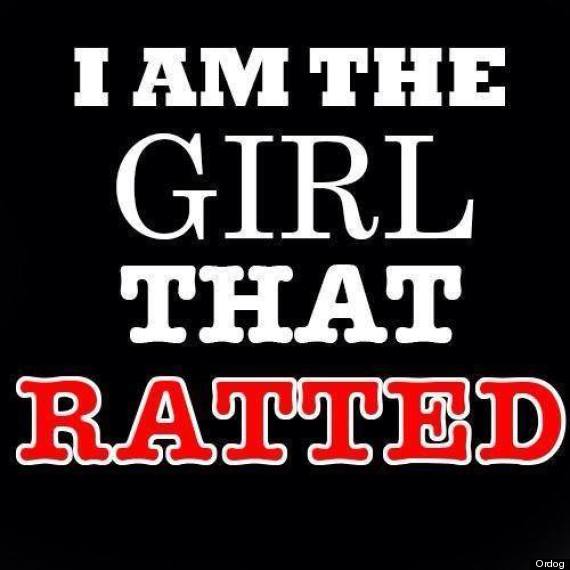In February of this year, a charge of rape at the AEPi frat house was filed with Vanderbilt Police. However, it was not until recent weeks that a thread regarding the alleged rape arose on the college gossip forum CollegiateACB.com. Entitled "girl that ratted," the thread obscenely disparaged the girl for reporting the incident to police. On Wednesday, the editor-in-chief of The Vanderbilt Hustler wrote an opinion column spotlighting how the thread provided a powerful example of rape culture on campus (which was picked up by The Huffington Post the next day).
Then two days later, Vanderbilt sophomore Julia Ordog started a Facebook photo campaign, asking students to change their profile picture to images declaring "I am the Girl That Ratted" or just "I Ratted" in order to show solidarity with both the girl who was named in the thread and to support the right of all victims of such violence to speak out. The campaign immediately went viral on campus and continued to gain traction over the weekend.
In response, some have cautioned that the charge is still under investigation and that we shouldn't take a stand either way until we know all the facts. Others have countered that the profile picture campaign is more about showing support for all victims of such violence who speak up, not just one individual in one particular instance.
Personally, I believe this campaign is well-intentioned, and my Facebook account is currently sporting the red, white and blue photo as its profile picture. However, the campaign has raised an issue that I find often comes up whenever people discuss rape and other kinds of sexual violence: defining the "victim" or "survivor" solely by what has happened to them.
According to Ordog, the purpose of the campaign's wording is to communicate that anyone can be a victim of such violence. This is certainly a valid point, and one that needs to be made. However, an unfortunate byproduct of this "it could be anyone" mentality is that all too often, we end up thinking of "anyone" as "no one." We lose these individuals' humanity among the anonymity, forget the person behind the profile pictures.
Since identities are often kept anonymous in situations like these (especially while the charges are still under investigation), it can be easy to unconsciously define "survivors" by this single experience. Suddenly, they are no longer individuals, but depersonalized "sexual assault victims" or "rape survivors."
Obviously, rape, sexual assault and other similar abuse will undeniably alter a person's life. But it's not the only thing that shapes him or her. This is not to say that we shouldn't refrain from concealing victim's identities (far from it). Instead, we should try to think of them as individuals, at least as much as possible, rather than painting them all with same brush of "victims" or "survivors."
For example, I was sexually abused as a child. If you were to read about me in a news article, I would merely be the "child abuse victim." You wouldn't know that I'm also a writer, a college student, an introvert, a dog person, an incurable work-out-aholic, a glasses wearer, a book lover, and a coffee devotee. Or say I had revealed what happened to me without giving all of this other personal information -- would you even have tried to think beyond the first label of "victim" if I hadn't asked you to?
"The girl that ratted" -- whoever she is -- is also a person. Despite my profile picture's claim (and that of dozens of my friends' accounts), I am not the girl who ratted. She is a unique human being who is going about her own day somewhere on the Vanderbilt campus right now. Maybe she has freckles or dimples or red hair, or all three. She has a hometown and a family and perhaps a pet. She might love chai tea lattes or be deathly afraid of especially tall and rickety elevators. She probably hated that one class she had to take to fulfill core requirements and has a secret study spot she always goes to during finals.
In short, "the girl that ratted" is so much more than just that, and so is everyone who has been through what she has, whether they are female or male, young or old, silent and unknown, or outspoken and recognized. Whether they choose to speak out about it or not, "victims" of rape and other sexual violence are not entirely defined by what has happened to them, and we should not treat them as if they are. If the campaign is indeed about anyone who has experienced sexual violence, then let's remember that behind each of these "anyones" is a living, breathing person, even if we don't know her (or his) name and face.
